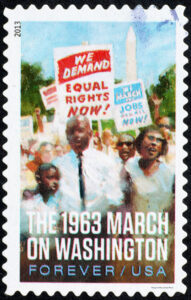The March on Washington’s 60th Anniversary
Tens of thousands of people gathered at the Lincoln Memorial in Washington. D.C., on Sunday, August 27, 2023, for the 60th anniversary of the March on Washington. The event was organized jointly by the National Action Network and the Drum Major Institute. The goal of the event was to call attention to the ongoing struggle for civil rights in the United States. The five-hour program presented a diverse lineup of speakers followed by a half-mile march to the Martin Luther King, Jr. Memorial.
The National Action Network is a civil rights organization founded by the Reverend Al Sharpton. He spoke about the importance of keeping the civil rights movement moving forward. The Drum Major Institute is run by members of the King family. Dr. King’s eldest son, Martin Luther King III, spoke on issues that included protecting voting rights and ending gun violence. Dr. King’s fifteen-year-old granddaughter, Yolanda Renee King, spoke about the work left to do to achieve her grandfather’s dream for America.
Diverse Speakers with a Message of Diversity

The only woman scheduled to speak at the 1963 March on Washington was Myrlie Evers, the widow of slain civil rights activist Medgar Evers. But Myrlie Evers could not make it through traffic to the historic event that day. Instead, Daisy Bates, a journalist and civil rights activist, gave the scheduled tribute to the women fighting in the civil rights movement.
At the 60th anniversary of the march, Myrlie Evers once again was unable to deliver her remarks in person. She is now an impressive ninety-one years old. However, her daughter, Trina Evers Everett, spoke on her behalf. She is the Executive Director of the Medgar and Myrlie Evers Institute. She delivered her mother’s message encouraging women to continue to fight for civil rights and to remember the importance of voting.
Other speakers included Shavon Arline-Bradley, the President of the National Council of Negro Women (NCNW); Larry Wright, Jr., the Executive Director of the National Congress of American Indians (NCAI); John Yang, the President of Asian Americans Advancing Justice (AAJC); and Kelley Robinson, President for the Human Rights Campaign (HRC).
Continuing The Fight for Civil Rights
Andrew Young, Jr., aged ninety-one, spoke on the importance of voting rights. In the 1960s, Andrew Young, Jr., was the executive director of the Southern Christian Leadership Conference (SCLC). He worked with Martin Luther King, Jr., to further the fight for civil rights for African Americans. He later served as the mayor of Atlanta, a congressman from Georgia, and as the U.S. Ambassador to the United Nations.
Some members of Congress also spoke at the event. House Minority Leader Hakeem Jeffries, a representative from New York, South Carolina’s Jim Clyburn, and Florida’s Representative Deborah Wasserman Schultz spoke about the need to continue fighting against racism and hate. They, too, called upon Congress to pass voting rights protections. They said these protections are needed because some states have passed new voting regulations that restrict the right to vote.
Looking Back on the 1963 March
The 1963 March on Washington for Jobs and Freedom attracted 250,000 people to the National Mall. It is a landmark event in civil rights history. It was on this day that Martin Luther King, Jr., delivered his “I Have a Dream” speech.
The main organizers of the event were A. Philip Randolph and Bayard Rustin. The “Big Six” leaders of the major civil rights organizations were scheduled to speak: A. Philip Randolph; John Lewis of the Student Nonviolent Coordinating Committee (SNCC); James Farmer of the Conference of Racial Equality (CORE); Whitney Young, Jr., of the National Urban League; Roy Wilkins of the National Association for the Advancement of Colored People (NAACP); and Reverend Martin Luther King, Jr., of the Southern Christian Leadership Conference (SCLC). James Farmer was unable to attend the event because he was jailed for demonstrating against police brutality. His speech was read by Floyd McKissick.
In addition to the speakers, singers Marian Anderson, Mahalia Jackson, and Joan Baez each performed that day on the steps of the Lincoln Memorial.
